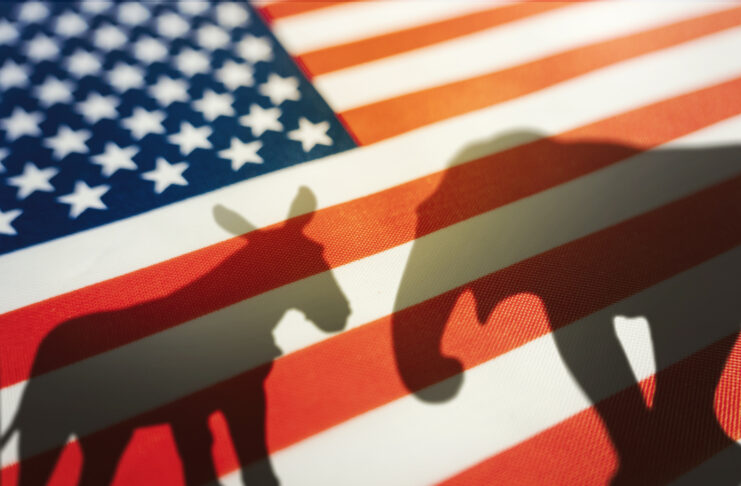More signs that we're in the (very) silly season before the presidential election campaigns shift into high gear: the mutterings that a third party or independent candidate could spell doom for the incumbent.
The press has a number of such articles recently, and this one, which originated on Bloomberg, is a classic of the genre. The basic thesis: polls show voters are open to a third-party candidate. That means Joe Biden is in trouble.
Setting aside the question of whether Mr. Biden is in trouble (we won't know for many months whether this is close to true), does a poll issued a year out from the major parties nominating conventions touting a third-party run hold even a drop of credibility?
Of course not, even though the pollster, Quinnipiac, is as good as any polling unit out there today.
But let's take a closer look…
The Quinnipiac poll begins with a huge assumption: that Joe Biden and Donald Trump are your 2024 nominees. While that seems like the most likely outcome today – and both men are currently the prohibitive frontrunners for their respective party nominations – it's still an assumption. And political history is littered with assumptions about who would win.
But let's roll with the assumption for a bit. In this hypothetical match-up, Biden leads Trump among registered voters 49-44 percent. Good enough for a data point but not much else. In this question, though, only two percent of voters want someone else.
Later, respondents were asked if they would consider voting for a third-party candidate. No names used – just a “has it crossed your mind' sort of question. Respondents split evenly between 47 percent “yes” to 47 percent “no” on whether they might think of voting for a third-party candidate.
The partisan breakdown: Republicans are against the idea of a third-party option 57 percent to 38 percent. Democrats split 61 percent “no” and 35 percent “yes.”
It's self-styled independents who are really itching – or at least say they are right now – for a third-party option. They back the idea 64 percent to 30 percent.
So, obviously a bad result for…Joe Biden? Donald Trump? Take your pick – it's July 2023 after all; prognosticating on an unknown third-party candidate who might run a year from now carries no consequences.
And that's exactly what the press does, spilling pixels across the screen pondering whether the “No Labels” group will upend the entire political world with a blockbuster candidate next. Or that one of an assortment of political gadflies will cut into a major party nominee's base of support.
It's all good fun…that ignores the very real difficulties of mounting a credible third-party candidacy. And even if a candidate can get on the ballot in every state, amasses the resources needed to run effective campaigns in the battleground states and demonstrate the polling strength to get into the prime-time televised debates, there's still the biggest challenge of all…
…getting people to actually vote for a third-party candidate on Election Day.
A general rule of thumb for third-party candidates is to take whatever their polling number is in October, halve it to get the real number of supporters (as opposed to people just having fun with the pollster), then halve it again when the vote occurs.
Taking the absolute most optimistic case – that 47 percent of the people in Quinnipiac poll who said they would consider a third-party candidate actually do so a year from now – what happens?
Halve the 47 percent to show more solid support. We're down to 23.5 percent. Halve that again for actual votes for said candidate and the popular vote total is less than 12 percent. That's less than George Wallace got in 1968 – when he polled 13.5 percent and actually won 46 electoral votes. And a lot less than Ross Perot got in 1992 when he won almost 19 percent of the popular vote…but no electoral votes.
Again – pure prognostication based on events a year and more from today with a host of unknowns not figured into the mess.
The bottom line: third-party candidates have the possibility, in the abstract, to affect an election's outcome. But more often, and particularly in this century, they don't make much difference at all.
The opinions expressed in this article are those of the author and do not necessarily reflect the positions of American Liberty News.
READ NEXT: Top Dem Caught Carrying Revolting Secret – Insulting Our Fallen Heroes



A win for biden is the end of our country as we know it!
Of course it is.
I think JFK Jr. has a good chance of getting on the ballot. I don’t think the Dems will allow Biden to run again in 2024 if he isn’t thrown in the clink, removed by impeachment, or strokes out. Hillary might Arkancide him, but I don’t expect he will be the Dem nominee. Trump has more baggage than United Airlines and the FBI, CIA, DNC, and the news media are doing their best to destroy him at any cost. If they do, I expect DeSantis to be the Republican nominee. I don’t know who the Dems will run in 2024, the only name I’ve heard mentioned is Newsome of the formerly Golden State, a committed Socio-Fascist. Whatever the case I will vote for the Republican nominee whoever that might be. I don’t hold out much hope for a civil war prior to the 2024 elections.